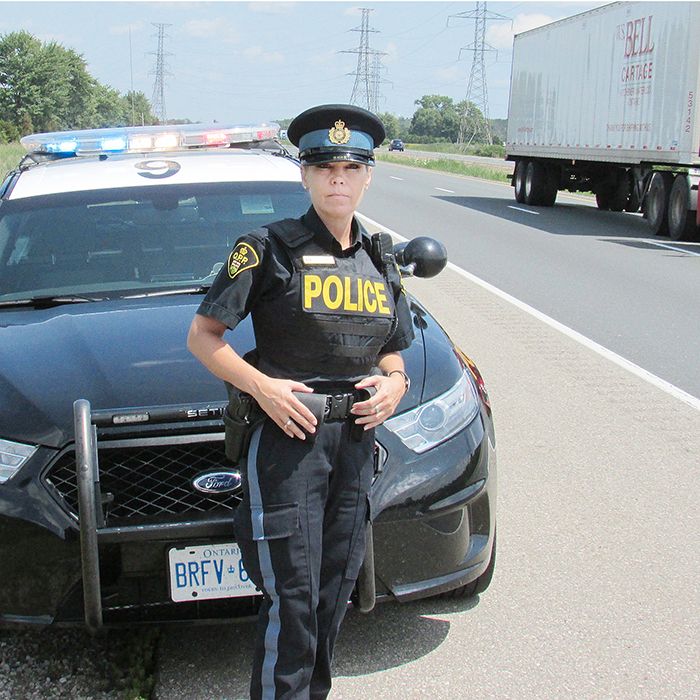- OPP Const. Janine Belanger outside her cruiser on Highway 401. The local detachment has issued more than $40,000 in fines already this year for motorists violating the Move Over law.
It comes with a roar, followed by a blast of wind that can put you back on your heels if you don’t brace yourself.
If you’re trying to do your job, it makes an already dangerous situation potentially fatal.
Having vehicles as large as a 40-tonne transport speed by at 100 km/h within a body length of emergency personnel was supposed to be a thing of the past in Ontario.
LEADWAVE Technologies from Chatham Voice on Vimeo.
The Move Over law has been in effect for a decade but a Civic Holiday weekend crackdown resulted in 56 charges by OPP in Chatham-Kent, more than the number laid in all of last year.
In fact, more than 90 charges have been laid in the first eight months of this year, nearly double 2013’s total of 47.
It’s more than frustrating for Chatham-Kent OPP communications officer Const. Janine Belanger who each day walks by plaques at the detachment’s Park Avenue office commemorating the careers and lives of two former members cut short in roadside accidents.
Sgt. Margaret Eve and Sr. Const. James McFadden are two of the five members of the OPP whose deaths during roadside stops contributed to the development of Ontario’s Move Over law.
Belanger said the excuse used by many that they don’t know the law exists is wearing thin.
“It’s very hard to believe someone when you pull someone over and they say they didn’t know about the law,” she said. “I’ve even had a transport truck driver tell me that, and I know the law is taught in their training.”
The law requires motorists to slow down and proceed with caution when passing an emergency vehicle, with its lights activated, parked on the side of the highway.
If the highway has more than one lane, drivers are required to move over and leave one lane between their vehicle and the parked emergency vehicle, if it can be done safely.
Belanger is even reluctant to call violations of the law that result in injury as accidents.
“An accident is when something unforeseen happens. Not moving over when an emergency vehicle is parked with its lights flashing isn’t an accident,” she said.
Belanger said moving over allows drivers a greater margin of error when coming on a potentially dangerous situation. “When you’re driving, your eye is drawn to the lights and your vehicle goes where you’re looking. If you’re in the right lane, you have very little room for error. If you’re a lane away, you are much safer.”
Penalties for being ticketed are steep, reflecting the seriousness of the violation.
“The roadside cost is a minimum of $490, but a Justice of the Peace has the ability to impose a fine of up to $2,000 for a first offence,” she said. “In addition, there is a three-demerit point penalty.”
Subsequent convictions carry fines of up to $4,000, a possible license suspension and jail sentence of up to six months.
“It makes sense to move over even if it wasn’t the law,” Belanger said. “Police, emergency responders, tow truck operators and others are trying to do a difficult job. The harm you could do is enormous and the cost you could pay might be only the beginning.”








It’s very hard to believe someone when you pull someone over and they say they didn’t know about the law,” she said. “I’ve even had a transport truck driver tell me that, and I know the law is taught in their training.” <—have you been to every one?